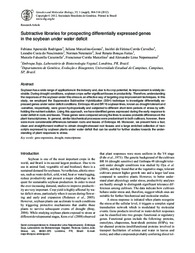Subtractive libraries for prospecting differentially expressed genes in the soybean under water deficit.
Subtractive libraries for prospecting differentially expressed genes in the soybean under water deficit.
Author(s): RODRIGUES, F. A.; MARCOLINO-GOMES, J.; CARVALHO, J. de F. C.; NASCIMENTO, L. C. do; NEUMAIER, N.; FARIAS, J. R. B.; CARAZZOLLE, M. F.; MARCELINO, F. C.; NEPOMUCENO, A. L.
Summary: Soybean has a wide range of applications in the industry and, due to its crop potential, its improvement is widely desirable. During drought conditions, soybean crops suffer significant losses in productivity. Therefore, understanding the responses of the soybean under this stress is an effective way of targeting crop improvement techniques. In this study, we employed the Suppressive Subtractive Hybridization (SSH) technique to investigate differentially expressed genes under water deficit conditions. Embrapa 48 and BR 16 soybean lines, known as drought-tolerant and -sensitive, respectively, were grown hydroponically and subjected to different short-term periods of stress by withholding the nutrient solution. Using this approach, we have identified genes expressed during the early response to water deficit in roots and leaves. These genes were compared among the lines to assess probable differences in the plant transcriptomes. In general, similar biochemical processes were predominant in both cultivars; however, there were more considerable differences between roots and leaves of Embrapa 48. Moreover, we present here a fast, clean and straightforward method to obtain drought-stressed root tissues and a large enriched collection of transcripts expressed by soybean plants under water deficit that can be useful for further studies towards the understanding of plant responses to stress.
Publication year: 2012
Types of publication: Journal article
Unit: Embrapa Soybean
Keywords: Deficiência hídrica, Drought, Estiagem, Gene, Gene expression, Genoma, Relação água-planta, Seca, Soja, Soybeans
Observation
Some of Embrapa's publications are published as ePub files. To read them, use or download one of the following free software options to your computer or mobile device. Android: Google Play Books; IOS: iBooks; Windows and Linux: Calibre.
Access other publications
Access the Agricultural Research Database (BDPA) to consult Embrapa's full library collection and records.
Visit Embrapa Bookstore to purchase books and other publications sold by Embrapa.

